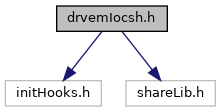#include <initHooks.h>#include <shareLib.h>

Go to the source code of this file.
Functions | |
| void epicsShareFunc | mrmEvrSetupPCI (const char *id, const char *pcispec) |
| void epicsShareFunc | mrmEvrSetupVME (const char *id, int slot, int base, int level, int vector) |
| void epicsShareFunc | mrmEvrDumpMap (const char *id, int evt, int ram) |
| void epicsShareFunc | mrmEvrForward (const char *id, const char *events_iocsh) |
| Setup Event forwarding to downstream link. More... | |
| void epicsShareFunc | mrmEvrLoopback (const char *id, int rxLoopback, int txLoopback) |
| void epicsShareFunc | mrmEvrInithooks (initHookState state) |
| long epicsShareFunc | mrmEvrReport (int level) |
| void epicsShareFunc | mrmEvrProbe (const char *id) |
Variables | |
| epicsShareExtern int | evrmrmVerb |
| Extra noise control. More... | |
Function Documentation
◆ mrmEvrDumpMap()
| void epicsShareFunc mrmEvrDumpMap | ( | const char * | id, |
| int | evt, | ||
| int | ram | ||
| ) |
Definition at line 870 of file drvemSetup.cpp.
◆ mrmEvrForward()
| void epicsShareFunc mrmEvrForward | ( | const char * | id, |
| const char * | events_iocsh | ||
| ) |
Setup Event forwarding to downstream link.
Control which events will be forwarded to the downstream event link when they are received on the upstream link. Useful when daisy chaining EVRs.
When invoked with the second argument as NULL or "" the current forward mapping is printed.
The second argument to this function is a comma seperated list of event numbers and/or the special token 'all'. If a token is prefixed with '-' then the mapping is cleared, otherwise it is set.
After a cold boot, no events are forwarded until/unless mrmrEvrForward is called.
- Parameters
-
id EVR identifier events A string with a comma seperated list of event specifiers
Definition at line 924 of file drvemSetup.cpp.
◆ mrmEvrInithooks()
| void epicsShareFunc mrmEvrInithooks | ( | initHookState | state | ) |
Definition at line 722 of file drvemSetup.cpp.
◆ mrmEvrLoopback()
| void epicsShareFunc mrmEvrLoopback | ( | const char * | id, |
| int | rxLoopback, | ||
| int | txLoopback | ||
| ) |
Definition at line 992 of file drvemSetup.cpp.
◆ mrmEvrProbe()
| void epicsShareFunc mrmEvrProbe | ( | const char * | id | ) |
◆ mrmEvrReport()
| long epicsShareFunc mrmEvrReport | ( | int | level | ) |
Definition at line 371 of file drvemSetup.cpp.
◆ mrmEvrSetupPCI()
| void epicsShareFunc mrmEvrSetupPCI | ( | const char * | id, |
| const char * | pcispec | ||
| ) |
Definition at line 440 of file drvemSetup.cpp.
◆ mrmEvrSetupVME()
| void epicsShareFunc mrmEvrSetupVME | ( | const char * | id, |
| int | slot, | ||
| int | base, | ||
| int | level, | ||
| int | vector | ||
| ) |
Definition at line 753 of file drvemSetup.cpp.
Variable Documentation
◆ evrmrmVerb
| epicsShareExtern int evrmrmVerb |
Extra noise control.
Controls level of extra diagnositic output from the EVR MRM device support. Error messages are always printed.
0 - No output 1 - Basic Startup 2 - Extended startup some "write" 3 - All "write" (output record processing) 4 - Some "read" (input record processing) and IRQ
Definition at line 33 of file drvemIocsh.h.
 1.8.13
1.8.13